Research and Resources
Find out more through these reputable authors and sources.
Personal Enrichment
These guides can help inform your personal practice.
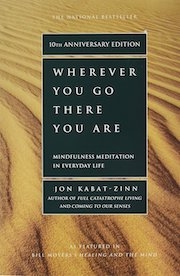
Wherever You Go There You Are by Jon Kabat-Zinn
“The spirit of mindfulness is to practice for its own sake, and just to take each moment as it comes—pleasant or unpleasant, good, bad, or ugly—and then work with that because it is what is present now. With this attitude, life itself becomes a practice.” p.23
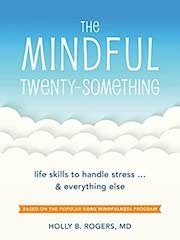
The Mindful Twenty-Something by Holly Rogers, MD
The handbook for the Koru certification program.
“Mindfulness helps you develop the internal conditions that lead to enduring happiness so that you are not so vulnerable to the constantly changing external conditions of your life experience. Thus, it offers you the opportunity to maintain your peace of mind no matter what events you encounter.” p.13
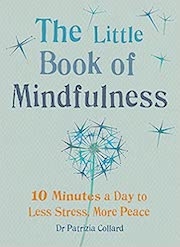
The Little Book of Mindfulness: 10 Minutes a Day to Less Stress, More Peace by Dr. Patrizia Collard
A small pocket book with brief practices for everyday living.
Peace
There is only silence
On the mountain tops
Among the tips of the trees
You perceive barely a breath
Even the birds in the forest
Keep still and are silent
Wait then
Just a little while longer
And you too
will find peace at last.
J.W. von Goethe translated by Patrizia Collard
Pedagogy and Higher Education Development
Find resources for enriching your teaching.
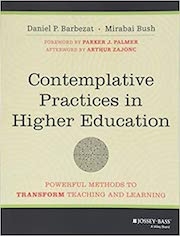
Contemplative Practices in Higher Education by Daniel Barbezat and Mirabai Bush
“We believe that at its core, the academy must provide students with the opportunity to initiate and pursue an inquiry into their role in society, an inquiry that makes learning personal, meaningful, and relevant.” p.8
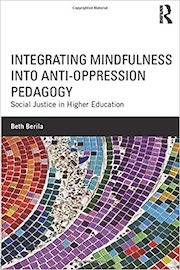
Integrating Mindfulness into Anti-Oppression Pedagogy by Beth Berila
“The challenge for us as anti oppression educators is to help students learn how to deeply and productively engage in these hard conversations, unpack the learned ideologies that produce inequalities in society, and learn more equitable and empowering ways of relating to one another. Fraught social issues such as the killing of Michael Brown, and the long history f deaths of young Black men that it continues, provide relevant and necessary examples to examine in social jus tice classes. But how to do so with intellectual nuance, analytical vigor, historical context, and empathy and compassion is still a challenge. Some students reiterate stereotypical ideas that make the conversation even more painful for those who are directly affected by the issue, while the pain and fierce fury of the latter some times overwhelms and seems out of place to those students who are not placing the situation within its trenchant historical context. The stakes for learning how to navigate these conversations are high, because the students in our classrooms will be shaping our societies for years to come. If they do not learn the skills in our courses, I am not sure where they will learn them.” p.18
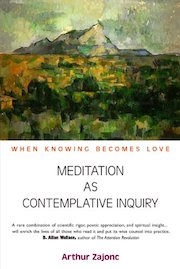
Meditation as Contemplative Inquiry by Arthur Zajonc
“When we turn to meditation, we are turning toward renewal, peace, and insight. Initially, we may take up contemplative practice as a means of tapping into the abundant resources of the mind and heart that bring serenity, but the meditative journey leads further—to the place where wisdom and love unite.” - Description
- Davis L. C. (2015). When Mindfulness Meets the Classroom. The Atlantic, https://www.theatlantic.com/education/archive/2015/08/mindfulness-educa…;
- Smith, V. P. Contemplative Practices and Foreign Language Study. Brown Contemplative Studies Department. Article
- Zajonc, A. (2006). Contemplative and Transformative Pedagogy. Kosmos Journal. Article
Academic Studies
Check the facts and understand the science supporting mindfulness and meditation.
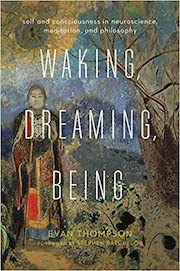
Waking, Dreaming, Being: Self and Consciousness in Neuroscience, Meditation, and Philosophy by Evan Thompson
“Although cognitive science and the Indian yogic traditions of philosophy and meditation form the core of this book, I also draw from a wide range of other sources — poetry and fiction, Western philosophy, Chinese Daoism, and personal experience. By weaving together these diverse sources, I hope to demonstrate a new way to relate science and what many people like to call spirituality. Instead of being either opposed or indifferent to each other, cognitive science and the world’s greatest contemplative traditions can work together on a common project — understanding the mind and giving meaning to the human life.” p.xl
- Good, D. J., et al. (2015). Contemplating Mindfulness at Work: An Integrative Review. Journal of Management. Article
- Pandey A., R. Chandwani, and A. Navare (2016). How can mindfulness enhance moral reasoning? An examination using business school students. Wiley Business Ethics, 27, 56–71. https://doi.org/10.1111/beer.12171
- Roberts-Wolfe, D., et al. (2012). Mindfulness training alters emotional memory recall compared to active controls: support for an emotional information processing model of mindfulness. Frontiers in Human Neuroscience. https://doi.org/10.3389/fnhum.2012.00015
- Shapiro, S. L., K. W. Brown, and J. A. Astin (2011). Toward the Integration of Meditation into Higher Education: A Review of Research Evidence. Teachers College Record, 113(3), 493–528. Summarized Report
- Zenner, C., S. Herrnleben-Kurz, and H. Walach (2014). Mindfulness-based interventions in schools—a systematic review and meta-analysis. Frontiers in Psychology. https://doi.org/10.3389/fpsyg.2014.00603
Literature, Society, and More
Find resources to answer questions about mindfulness as it applies to restorative practices, ecology, and more.
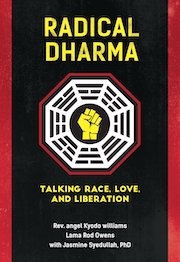
Radical Dharma by Rev. angel Kyodo Williams, Lama Rod Owens, and Jasmine Syedullah, PhD
“The book situates every person who claims the lineage of liberation—whether personal or social—within a tradition of radical social transformation, both as bodies moving against the stream and as bodies that bear the wisdom, witness, and wounds of intersecting and overlapping structures of violence, policing, and erasure. Every body bears these wounds, so when we bear witness to suffering, we bear the wisdom—prophetic wisdom—of liberation from that suffering. And we bear it together.” p. xvii
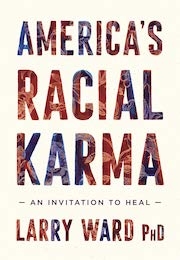
America’s Racial Karma: An Invitation to Heal by Larry Ward PhD
“To assume that our current racial dysfunction is disconnected from America’s continental and Eurocentric past is a delusion of the highest order. Our racial past echoes through the air we breathe and permeates the ground on which we walk. This fragmented consciousness predates our birth but still flows through our neural networks, the veins of our being. When it comes to matter of race in America, we are caught in a cycle of reactivity…If we can learn to stop and look deeply into these energies, we can discover the courage, connection, and imagination to embody a new world.” p.16
For a full and evolving list of books related to mindfulness or meditation, email the 2022 Mindfulness Fellow Zoya Kobets ‘24 at zkobets@middlebury.edu, or the Scott Center at scfsrl@middlebury.edu. The library circulation desk also keeps a list, inquire more from library_circulation@middlebury.edu.

